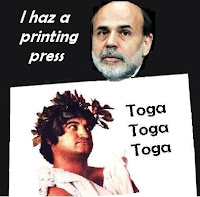It was interesting to see Jimmy's gloom being cast into the relatively mainstream media. BusinessWeek is like Time Magazine for those who have discovered that the money fairy does not fill their wallets each evening.
Pithy excerpts only. Clink the link for the full interview and Maria's questions.
BusinessWeek
Jim Rogers Doesn't Mince Words About the Crisis
By Maria Bartiromo
...It's pretty embarrassing for President Obama, who doesn't seem to have a clue what's going on—which would make sense from his background. And he has hired people who are part of the problem. ...These are people [Geithner and Summers] who think the only solution is to save their friends on Wall Street rather than to save 300 million Americans.
...What would I like to see happen? I'd like to see them let these people go bankrupt, let the bankrupt go bankrupt, stop bailing them out. There are plenty of banks in America that saw this coming, that kept their powder dry and have been waiting for the opportunity to go in and take over the assets of the incompetent. Likewise, many, many homeowners didn't go out and buy five homes with no income. Many homeowners have been waiting for this, and now all of a sudden the government is saying: "Well, too bad for you. We don't care if you did it right or not, we're going to bail out the 100,000 or 200,000 who did it wrong." I mean, this is outrageous economics, and it's terrible morality.
...Well, if Long-Term Capital Management had been allowed to fail, Lehman and the rest of them would've lost a huge amount of money, their capital would've been impaired, and it would've put a terrible crimp on Wall Street. It would've slowed them down for years. Instead of losing capital, losing assets, and losing incompetent people, they hired more incompetent people.
... banks and investment banks and insurance companies have been failing for hundreds of years. Yes, we would've had a terrible two years. But you're dragging out the pain. We had 10 years of the worst credit excesses in world history. You don't wipe out something like that in six months or a year by saying: "Oh, now let's wake up and start over again."
...They [Citigroup and the car companies] should be allowed to go bankrupt. Why should American taxpayers put up billions to save a few car companies? They made the mistakes! We didn't make the mistakes! I'm sure they'll give them the money, but I'm telling you, it's a mistake. It's a horrible mistake.
...They [the Wall Street Banks] all took huge, huge profits. Who was the head of Citigroup? Chuck Prince? I mean, how many hundreds of millions of dollars did Prince take out of the company? How many hundreds of millions of dollars did other Citibank execs take out of the company? Wall Street has paid something like $40 billion or $50 billion in bonuses in the past decade. Who was that guy who was the head of Merrill Lynch (MERR)?
.....Stan O'Neal. He got $150 million for leaving, even though he ruined the company. Look at the guy at Fannie Mae (FNM), Franklin Raines. He did worse accounting than Enron. Fannie Mae and Freddie Mac (FRE) alone did nothing but pure fraudulent accounting year after year, and yet that guy's walking around with millions of dollars. What the hell kind of system is this?
 ...We're going to have social unrest in much of the world. America won't be immune.
...We're going to have social unrest in much of the world. America won't be immune.
...Always in the past, when people have printed huge amounts of money or spent money they didn't have, it has led to higher inflation and higher prices. In my view, that's certainly going to happen again this time. Oil prices are down at the moment, but that's temporary. And you're going to see higher prices, especially of commodities, because the fundamentals of commodities are enhanced by what's happening.
... I really think agriculture is going to be the best place to be. Agriculture's been a horrible business for 30 years. For decades the money shufflers, the paper shufflers, have been the captains of the universe. That is now changing. The people who produce real things [will be on top]. You're going to see stockbrokers driving taxis. The smart ones will learn to drive tractors, because they'll be working for the farmers.
It's going to be the 29-year-old farmers who have the Lamborghinis. So you should find yourself a nice farmer and hook up with him or her, because that's where the money's going to be in the next couple of decades.


































